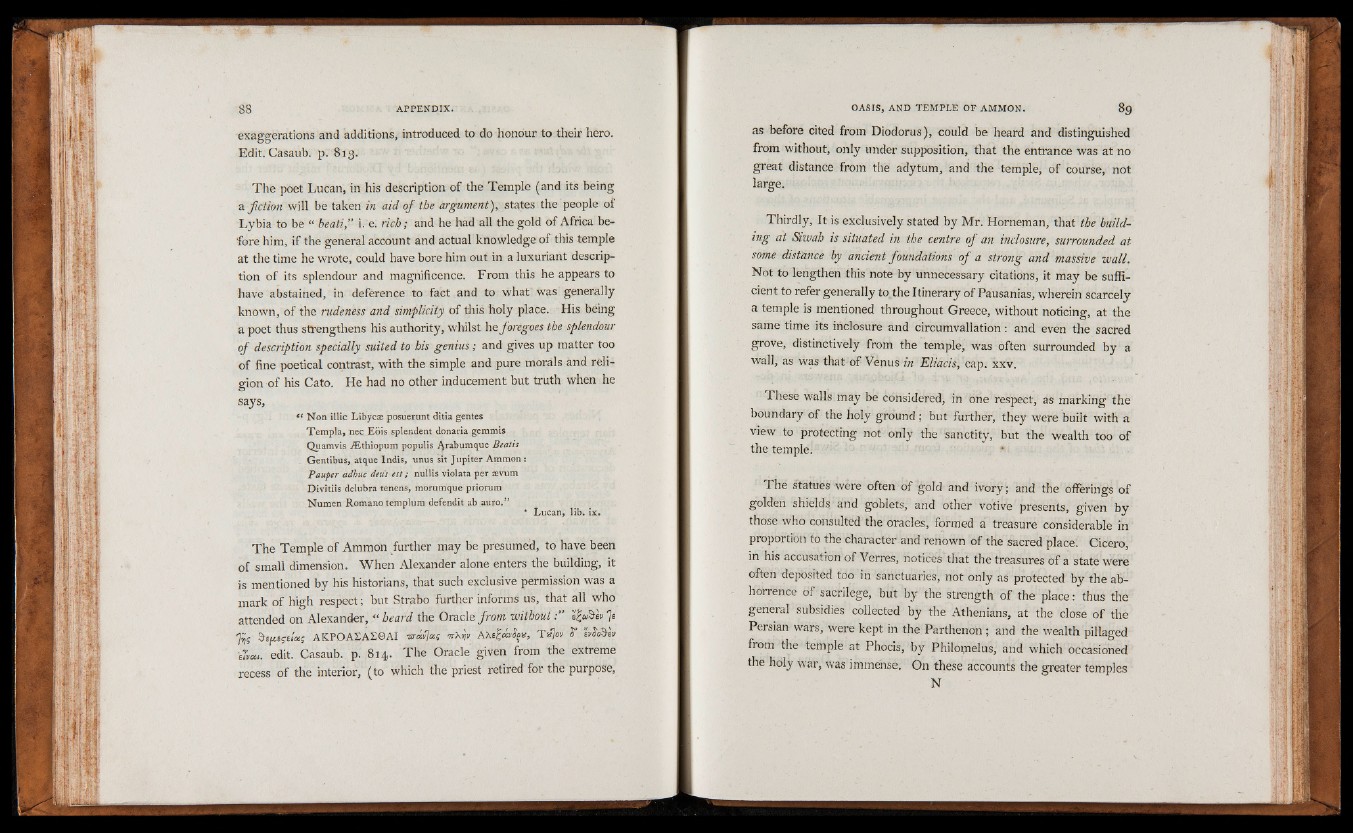
exaggerations and additions, introduced to do honour to their hero.
Edit. Casaub. p. 813.
The poet Lucan, in his description of the Temple (and its being
a j fiction will be taken in aid of the argument), states the people of
Lybia to be “ beati,” i. e. rich ; and he had all the gold of Africa before
him, if the general account and actual knowledge of this temple
at the time he wrote, could have bore him out in a luxuriant description
of its splendour and magnificence. From this he appears to
have abstained, in deference to fact and to what was generally
known, of the rudeness and simplicity of this holy place. His béing
a poet thus strengthens his authority, whilst he foregoes the splendour
of description specially suited to his genius ; and gives up matter too
of fine poetical contrast, with the simple and pure morals and religion
of his Cato. He had no other inducement but truth when he
says,
tl Non illic Libycæ posuerunt ditia gentes
Templa, nec Eois splendent donaria gemmis
Quamvis Æthiopum populis Arabumque Beatis
Gentibus, atque Indis, unus sit Jupiter Ammon :
Pauper adhuc deus est ; nullis violata per ævum
Divitiis delubra tenens, morumque priorum
.Numen Romano templum défendit ab auro.”
• Lucan, lib. ix.
The Temple of Ammon further may be presumed, to have been
of small dimension. When Alexander alone enters the building, it
is mentioned by his historians, that such exclusive permission was a
mark of high respect; but Strabo further informs us, that all who
attended on Alexander, “ heard the Oracle from without lluhdv 7s
M ^efA.sçdciç ABCPOASAS0 AI nrûvjuç A x fw f y x , T^ou i ' h io& v
uvcu. edit. Casaub. p. 814,. The Oracle given from the extreme
recess of the interior, (to which the priest retired for the purpose,
as before cited from Diodorus), could be heard and distinguished
from without, only under supposition, that the entrance was at no
great distance from the adytum, and the temple, of course, not
large.
Thirdly, It is exclusively stated by Mr. Horneman, that the building
at Srwah is situated in the centre of an inclosure, surrounded at
some distance by ancient foundations of a strong and massive wall.
Not to lengthen this note by unnecessary citations, it may be sufficient
to refer generally to.the Itinerary of Pausanias, wherein scarcely
a temple is mentioned throughout Greece, without noticing, at the
same time its iriclosure and circumvallation: and even the sacred
grove, distinctively from the temple, was often surrounded by a
wall, as was that of Venus in Eliacis, cap. xxv.
These walls may be considered, in one respect, as marking the
boundary of the holy ground ; but further, they were built with a
view to protecting not only the sanctity,- but the wealth too of
the temple. I
The statues were often of-gold and ivory ; and the offerings of
golden shields and goblets, and other votive presents, given by
those who consulted the oracles, formed a treasure considerable in
proportion to the character and renown of the sacred place; Cicero,
in his accusation of Verres, notices that the treasures of a state were
often deposited too in sanctuaries, not only as protected by the abhorrence
of sacrilege, but by the strength of the place: thus the
general subsidies collected by the Athenians, at the close of the
Persian wars, were kept in the Parthenon; and the wealth pillaged
from the temple at Phocis, by Philopielus, and which occasioned
the holy war, was immense. On these accounts the greater temples
N